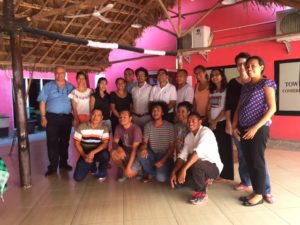
An innovative Flinders University program for Timor-Leste students about to come to Australia is preparing them for study before they leave home.
Staff of the Transition Office at Flinders designed a tailored workshop on Australian academic expectations and requirements and travelled to the Timor-Leste capital, Dili, to deliver it to 15 local students in November.
The students, who range in level from undergraduate to Masters and PhD, are about to commence Australia Award-funded study at various Australian universities.
Transition Office director Associate Professor Salah Kutieleh says Australia Award students from Timor-Leste faced an array of anxieties and practical problems in adjusting to academic life in Australian universities for various reasons, including resource-related and cultural factors.
Australia Award staff in Dili approached Flinders to run a pre-departure program for their grant recipients.
Adapted from the existing Introductory Academic Program (IAP) for overseas students at Flinders, the five-day workshop gave a grounding in the skills and requirements of academic writing and research, and provided the students with an understanding of the style of learning they would encounter.
Associate Professor Kutieleh said as well as helping the students in planning and preparing written work and structuring academic arguments, the sessions covered practical skills such as interacting with supervisors, referencing, and note-taking.
“And it all took place in a collegial, interactive and relaxing context,” Associate Professor Kutieleh said.
“We anticipate that developing relevant skills alongside a better understanding of standards and expectations will translate into a smoother transition and enhanced academic progress.
“The students were very enthusiastic about the course and felt much more confident about their prospects of success.
“As one of the students told us after the course: ‘Now I know what to expect’.”
Associate Professor Kutieleh says it is very likely that there would be demand for similar, customised academic preparation programs to be delivered in other countries in the region.

